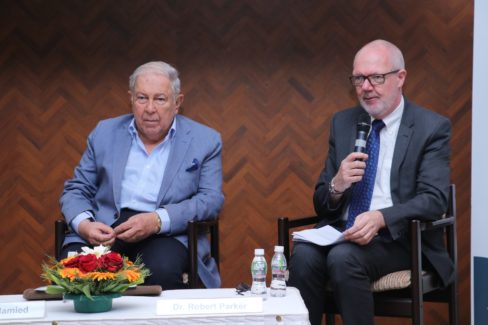
Mumbai, March 6, 2019:
The £800,000 Yusuf Hamied Inspiration Chemistry Programme in numbers:
- 23,000 science teachers trained – almost triple the initial
- 9,000 schools in 26 states
- 1,000 workshops were conducted
- 40 Teacher developers received master training
- 1,600 students attended chemistry camps at the leading universities
(50% of them are female students)
- Camps conducted in 10 regional languages
- Over 150 Indian partners
Renowned Indian business leader, scientist and philanthropist, Dr. Yusuf Hamied, has today announced the launch of the new Inspirational Science Programme with a significant donation to the Royal Society of Chemistry in India. News of the funding comes as Dr. Hamied and the Royal Society of Chemistry celebrate the successful completion of the Yusuf Hamied Inspirational Chemistry Programme (YHICP), which has helped deliver more than 1,000 training workshops to over 23,000 teachers between 2014 and the end of 2018. More than 9,000 schools across the 26 states of India benefited.
In addition, more than 1,600 students from 500 schools attended 26 Salters’ Chemistry camps across 16 states since 2015. The new four-year programme will pick up where the YHICP programme leaves off, aiming to:
- Expand provision of the Salters’ Chemistry Camps to reach a further 2,400 students from under-privileged backgrounds.
- Expand the provision of the Teacher Training workshops to reach 20,000 teachers by recruiting and training new Teacher Developers to cover most regions of India.

Rs. 8.7 crore has been committed to the programme.
Dr. Yusuf Hamied, chairperson of pharmaceuticals company Cipla and a pioneer of affordable medicines for patients in developing countries, said: “The first phase of this programme was a tremendous success, reaching three times more people than we had originally targeted. “The impact on education across the country cannot be underestimated. That’s why I am excited to announce the continuation of this programme with the Royal Society of Chemistry over the next four years, which I believe will deliver even greater results.”
The overarching aim of the programme is to give Indian teachers new tools for delivering engaging and effective science lessons, and to encourage students to reach the necessary standards to study science at university.
The next phase of the programme will reach more students and teachers over a wider geographical area, strengthen existing partnerships with leading Indian universities and will focus on tailoring our training to better equip teachers to educate and inspire the next generation of great Indian scientists.
Dr. Robert Parker, Chief Executive of the Royal Society of Chemistry, said: “Dr Hamied’s generosity has led to the establishment of a programme that has already helped hundreds of thousands of students. We are delighted that he has felt strongly enough about the benefit of this programme to support its expansion and we are excited to continue to deliver a programme of real benefit to Indian science.”
A key part of the new programme will be to explore the introduction of three new key enhancements; to translate teacher training content into selected local languages, to develop training modules to cover additional specific disciplines, and to explore how mobile access to the Royal Society of Chemistry’s teaching resources could complement the programme’s aims. After an exploratory phase, implementation of any additional activities would commence from 2020 onwards.
Dr. Yusuf Hamied added: “India’s next generation of chemists and scientists could play a significant role in shaping the world we live in and improving our day-to-day lives, which is why I am so passionate about this programme. We must make sure our teachers have the right tools and information to ensure students are excited and engaged by chemistry so we can nurture the next generation of talent. “The numbers we’ve seen over the past five years has been a fantastic indicator of the tremendous success of this partnership so far and long may that success continue.”
The Royal Society of Chemistry has a large number of active and enthusiastic members all across India and they have been working hard to support education in India for many decades. Dr. Parker was of the view that they could provide excellent opportunities for scientists to volunteer and get involved in supporting this programme.





